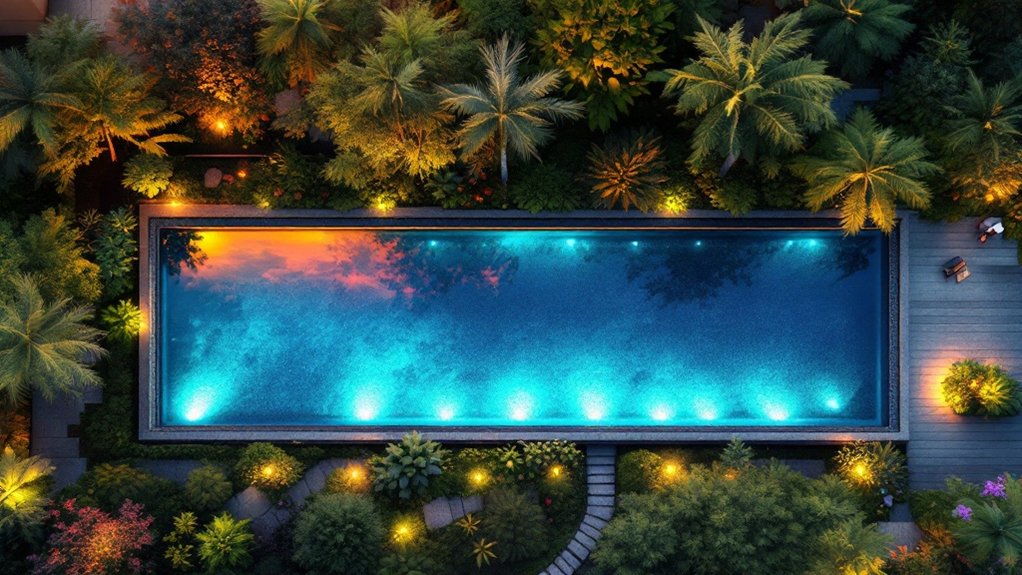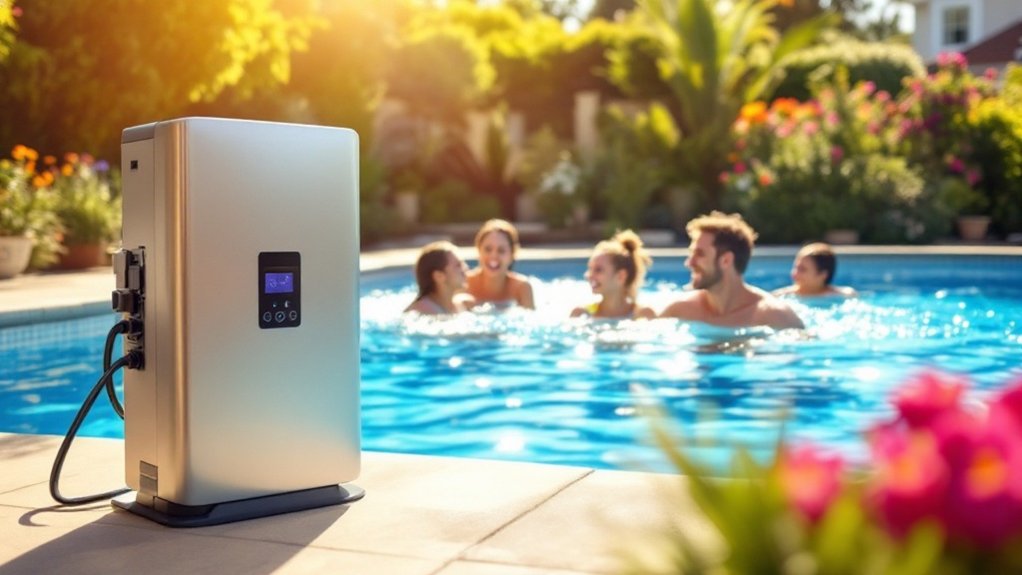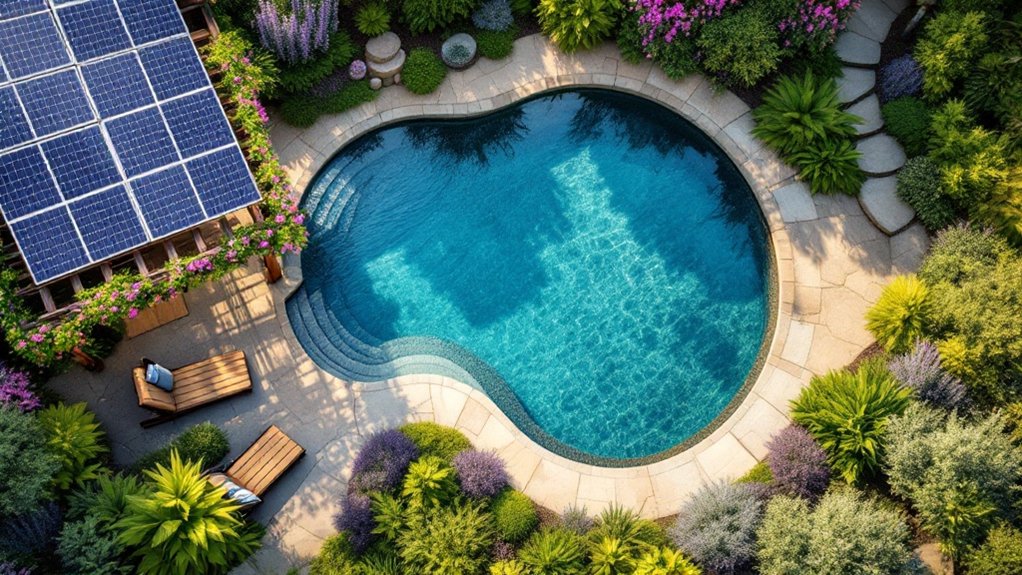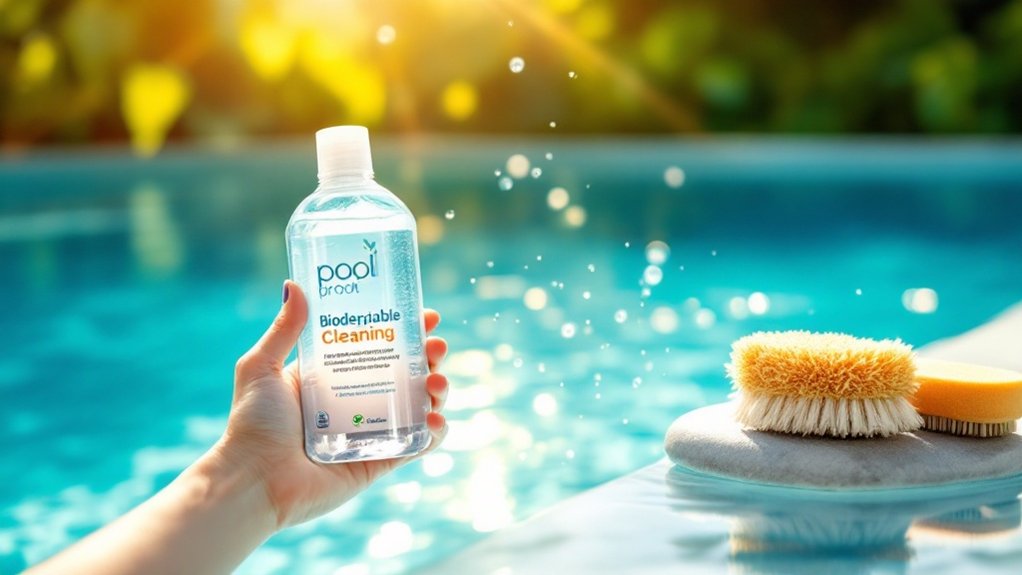The future of sustainable pool designs is emerging as a crucial aspect of modern architecture. With increasing awareness of environmental impact, designers are prioritizing eco-friendly materials and energy-efficient technologies. This shift aims to create pools that not only serve recreational purposes but also support ecological balance. As these innovations unfold, they raise questions about the integration of natural elements and smart technologies. What does this mean for the future of pool ownership?
The Importance of Sustainability in Pool Design
As the global focus on environmental conservation intensifies, the importance of sustainability in pool design has become increasingly apparent. Designers and homeowners alike recognize that creating pools with minimal ecological impact is essential for preserving natural resources. Sustainable pool design prioritizes energy efficiency, water conservation, and the integration of renewable energy sources. By minimizing chemical use and utilizing advanced filtration systems, these pools can considerably reduce their carbon footprint. In addition, the incorporation of smart technology enables better management of energy and water consumption. Ultimately, sustainable pool design not only enhances the aesthetic appeal of outdoor spaces but also aligns with broader environmental goals, promoting a healthier planet for future generations. This shift reflects a growing commitment to responsible and conscientious living.
Eco-Friendly Materials for Pool Construction
Sustainable pool design extends beyond energy efficiency and water conservation, encompassing the materials used in construction. Eco-friendly materials, such as recycled concrete, bamboo decking, and natural stone, considerably reduce the environmental impact of pool projects. Recycled glass tiles, for instance, not only offer aesthetic appeal but also help divert waste from landfills. Moreover, using low-VOC paints and sealants minimizes harmful emissions, promoting a healthier environment. Additionally, choosing local materials can decrease transportation emissions, further enhancing sustainability. Innovations in composite materials, which blend recycled plastics and wood fibers, provide durability and reduce maintenance needs. By prioritizing these eco-conscious options, pool builders contribute to a greener future while creating inviting spaces for enjoyment and relaxation.
Energy-Efficient Heating Solutions
How can pool owners maintain comfortable water temperatures while minimizing energy consumption? One effective approach is the implementation of energy-efficient heating solutions. Heat pumps, for instance, utilize ambient air to heat water, offering a sustainable alternative to traditional gas heaters. Solar pool heating systems, which harness sunlight, also provide significant energy savings and reduce carbon footprints. Additionally, automatic pool covers can retain heat, decreasing the need for continuous heating. By integrating these technologies, pool owners can achieve ideal water temperatures while lowering energy costs. Furthermore, advancements in smart thermostats allow for precise temperature control, ensuring that heating is only utilized when necessary. Overall, these energy-efficient heating solutions contribute to more sustainable pool management practices. Moreover, gas pool heaters provide efficient and reliable warmth to keep pools inviting throughout the year.
Innovative Water Filtration Systems
Innovative water filtration systems play an essential role in sustainable pool designs by utilizing eco-friendly technologies and materials. These systems incorporate biodegradable filter options that minimize environmental impact while ensuring clean water quality. Additionally, the integration of smart filtration technologies enhances efficiency and reduces resource consumption.
Eco-Friendly Filtration Technologies
A growing number of pool owners are turning to eco-friendly filtration technologies that prioritize both water purity and environmental responsibility. These systems utilize advanced methods such as UV purification, ozone generation, and ionization, greatly reducing the need for harsh chemicals. Unlike traditional filtration methods, eco-friendly technologies are designed to conserve energy and minimize water waste, promoting a more sustainable pool environment. Many of these systems also feature low-maintenance designs, which contribute to long-term cost savings for owners. By adopting these innovative filtration solutions, pool owners not only enhance the quality of their water but also align their recreational spaces with broader environmental goals. This shift reflects a growing awareness of sustainability in the domain of leisure and outdoor living.
Biodegradable Filter Materials
Many pool owners are exploring biodegradable filter materials as a sustainable alternative to traditional filtration systems. These innovative materials, derived from natural substances like coconut husks and plant fibers, offer effective filtration while minimizing environmental impact. Unlike conventional filters, which contribute to landfill waste, biodegradable options decompose over time, reducing pollution. Additionally, they can enhance water quality by promoting beneficial microorganisms that aid in breaking down contaminants. As awareness of environmental issues grows, the demand for such sustainable solutions is increasing. Manufacturers are responding by developing advanced biodegradable filters that maintain performance without compromising eco-friendliness. This shift not only appeals to environmentally conscious consumers but also aligns with broader efforts to create greener, more sustainable pool designs.
Smart Filtration Systems
Smart filtration systems are revolutionizing pool maintenance by leveraging advanced technology to optimize water quality and energy efficiency. These innovative systems utilize sensors and automated controls to monitor water conditions in real-time, adjusting filtration processes as needed. By employing advanced filtration techniques, such as ultraviolet light and ozone treatment, they greatly reduce the reliance on harsh chemicals, promoting a healthier swimming environment. Additionally, smart systems can integrate with home automation networks, allowing users to manage their pool settings remotely via smartphone apps. This capability not only enhances convenience but also contributes to energy savings by operating pumps and heaters only when necessary. As sustainability becomes increasingly important, smart filtration systems represent a crucial component of eco-friendly pool designs.
Smart Technology Integration in Pools
Integrating smart technology into pool designs revolutionizes the way homeowners interact with their outdoor spaces. Modern pools now feature automated systems that allow for remote control of heating, lighting, and filtration via smartphones or tablets. This connectivity enhances user convenience and promotes energy efficiency by allowing homeowners to monitor and adjust settings in real-time. Smart sensors can detect water quality and chemical levels, ensuring ideal conditions without manual intervention. Additionally, advanced safety features such as automatic covers and alarms provide peace of mind for families. The integration of smart technology not only elevates the swimming experience but also aligns with sustainable practices, reducing resource consumption and improving overall pool management. Furthermore, regular pool maintenance is essential to ensure that these smart systems operate efficiently and provide the maximum benefits for users. This technological advancement marks a new era in pool design and functionality.
Natural Swimming Pools: A Closer Look
Natural swimming pools offer an eco-friendly alternative to traditional pools, emphasizing both sustainability and aesthetics. Their design incorporates natural filtration systems that enhance water quality while requiring less maintenance. Understanding the benefits and practical tips for creating and caring for these pools can help homeowners make informed choices.
Benefits of Natural Pools
A growing number of homeowners are discovering the numerous advantages of natural swimming pools, which offer a harmonious blend of aesthetics and environmental benefits. These pools utilize natural filtration systems, reducing the need for harsh chemicals, thereby promoting a healthier swimming experience. Additionally, natural pools are designed to mimic the beauty of a natural ecosystem, integrating seamlessly into outdoor spaces and enhancing property value. They support biodiversity by providing habitats for various plants and wildlife, contributing to local ecosystems. Furthermore, the evaporation rates in natural pools are often lower than traditional pools, conserving water. Overall, natural swimming pools present an eco-friendly alternative that aligns with sustainable living practices, allowing homeowners to enjoy leisure while being mindful of the environment.
Design and Maintenance Tips
Creating a sustainable swimming pool requires careful consideration of design and maintenance practices. Natural swimming pools, which utilize biological filtration and plants, necessitate a thoughtful layout that balances aesthetics and functionality. It is vital to incorporate native aquatic plants that thrive in local climates, reducing the need for chemical treatments. Additionally, designers should guarantee sufficient sunlight exposure for ideal water quality.
Maintenance involves regular monitoring of water parameters and plant health. Implementing a skimming system can help manage debris while minimizing energy use. Seasonal adjustments, such as removing dead plants or adjusting water levels, are important for maintaining balance. Ultimately, these design and maintenance tips foster a healthy ecosystem while promoting sustainability in pool ownership.
Water Conservation Techniques
Implementing effective water conservation techniques is essential for sustainable pool designs. Pool owners can greatly reduce water waste by utilizing advanced filtration systems, which minimize the need for frequent water replacement. Additionally, employing pool covers can prevent evaporation, a major source of water loss, especially in warmer climates. Regular maintenance, including promptly fixing leaks and ensuring efficient water circulation, contributes to overall conservation efforts. Utilizing rainwater harvesting systems can also be beneficial, allowing homeowners to collect and use natural precipitation for pool replenishment. Moreover, integrating smart technology, such as automated water level sensors, can help monitor and manage water usage effectively. These techniques not only promote sustainability but also reduce operational costs, making them essential for environmentally responsible pool ownership.
Landscaping and Pool Integration for Environmental Harmony
Integrating landscaping with pool design enhances environmental harmony while complementing water conservation efforts. Thoughtfully designed landscapes can create a seamless connection between the pool area and surrounding nature, promoting biodiversity and reducing water runoff. Native plants and drought-resistant flora not only minimize irrigation needs but also provide habitat for local wildlife. Additionally, hardscaping elements, such as permeable pavers, can facilitate water absorption and reduce heat retention. Incorporating shade structures, like trellises with climbing plants, can lower pool temperatures and decrease evaporation rates. Overall, the synergy between landscaping and pool design fosters a sustainable environment, ensuring that both aesthetic appeal and ecological responsibility are preserved. This holistic approach ultimately contributes to healthier ecosystems and promotes a balanced relationship with nature.
Frequently Asked Questions
What Are the Costs Associated With Sustainable Pool Designs?
The costs associated with sustainable pool designs vary considerably, depending on materials, technology, and installation. Initial investments are often higher, but long-term savings and environmental benefits may offset these expenses, attracting eco-conscious consumers.
How Long Do Eco-Friendly Materials Last Compared to Traditional Options?
Eco-friendly materials typically last as long as traditional options, often matching or exceeding their durability. Factors such as maintenance, environmental conditions, and material quality ultimately influence their lifespan, ensuring sustainable choices remain viable long-term.
Can I Retrofit My Existing Pool to Be More Sustainable?
Retrofitting an existing pool to enhance sustainability is possible. Homeowners can consider solar heating systems, energy-efficient pumps, and eco-friendly liners. Each upgrade contributes to reduced environmental impact while maintaining pool functionality and aesthetics.
What Local Regulations Affect Sustainable Pool Construction?
Local regulations greatly impact sustainable pool construction, addressing water usage, energy efficiency, and eco-friendly materials. Compliance with zoning laws, safety standards, and environmental guidelines guarantees that new pools meet community sustainability goals and legal requirements.
How Can I Maintain a Sustainable Pool During Winter Months?
To maintain a sustainable pool during winter months, one should use a pool cover, minimize water evaporation, monitor chemical levels, and guarantee proper circulation to prevent freezing, thereby conserving resources and reducing environmental impact.
Conclusion
The future of sustainable pool designs heralds a transformative approach to leisure that prioritizes environmental stewardship. By embracing eco-friendly materials, energy-efficient technologies, and innovative water management systems, pool ownership can evolve into a responsible investment. As these designs harmonize with natural landscapes and promote biodiversity, they enhance both aesthetic appeal and property value. Ultimately, the shift towards sustainability in pool construction reflects a growing commitment to preserving the environment while enjoying the benefits of aquatic recreation.




